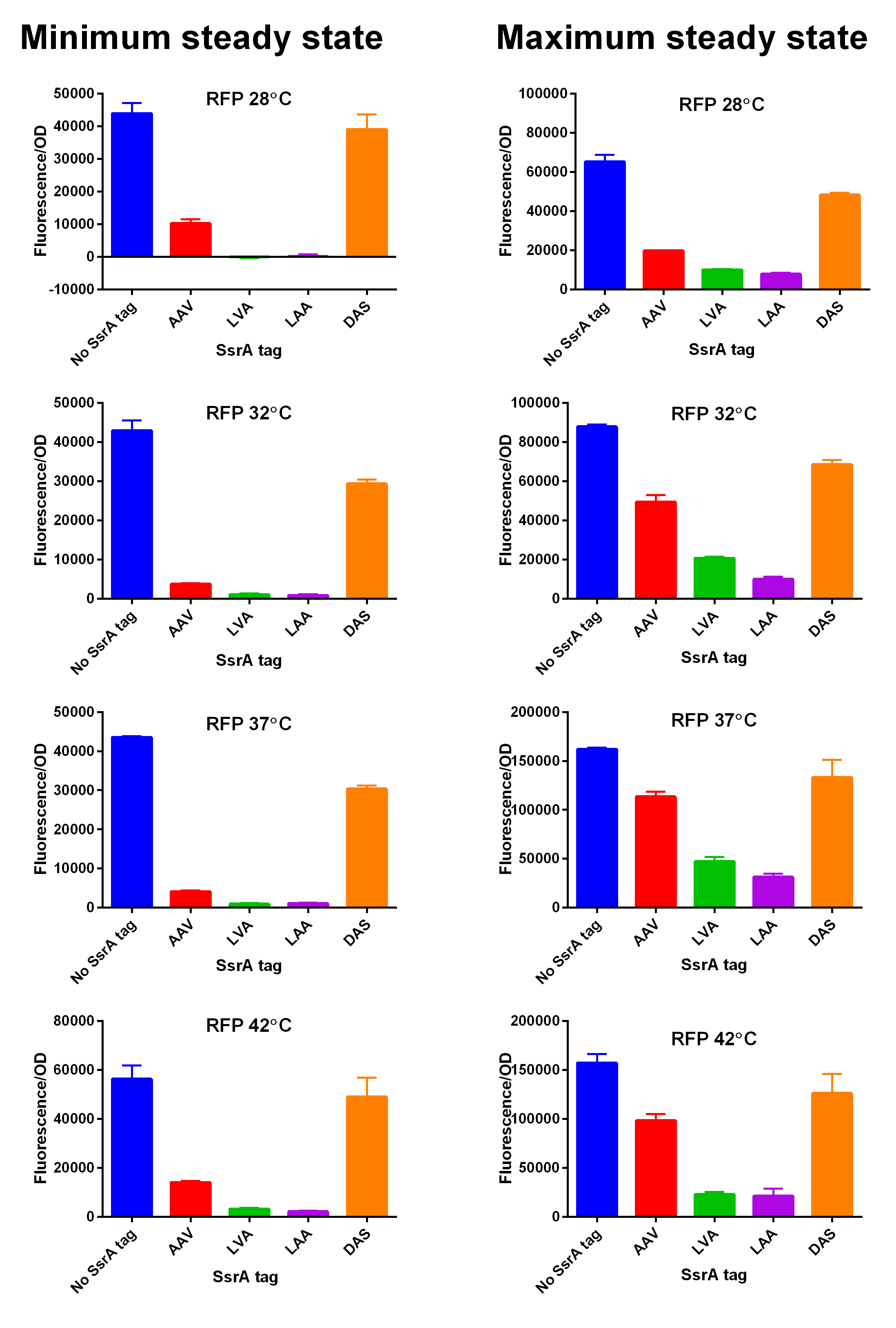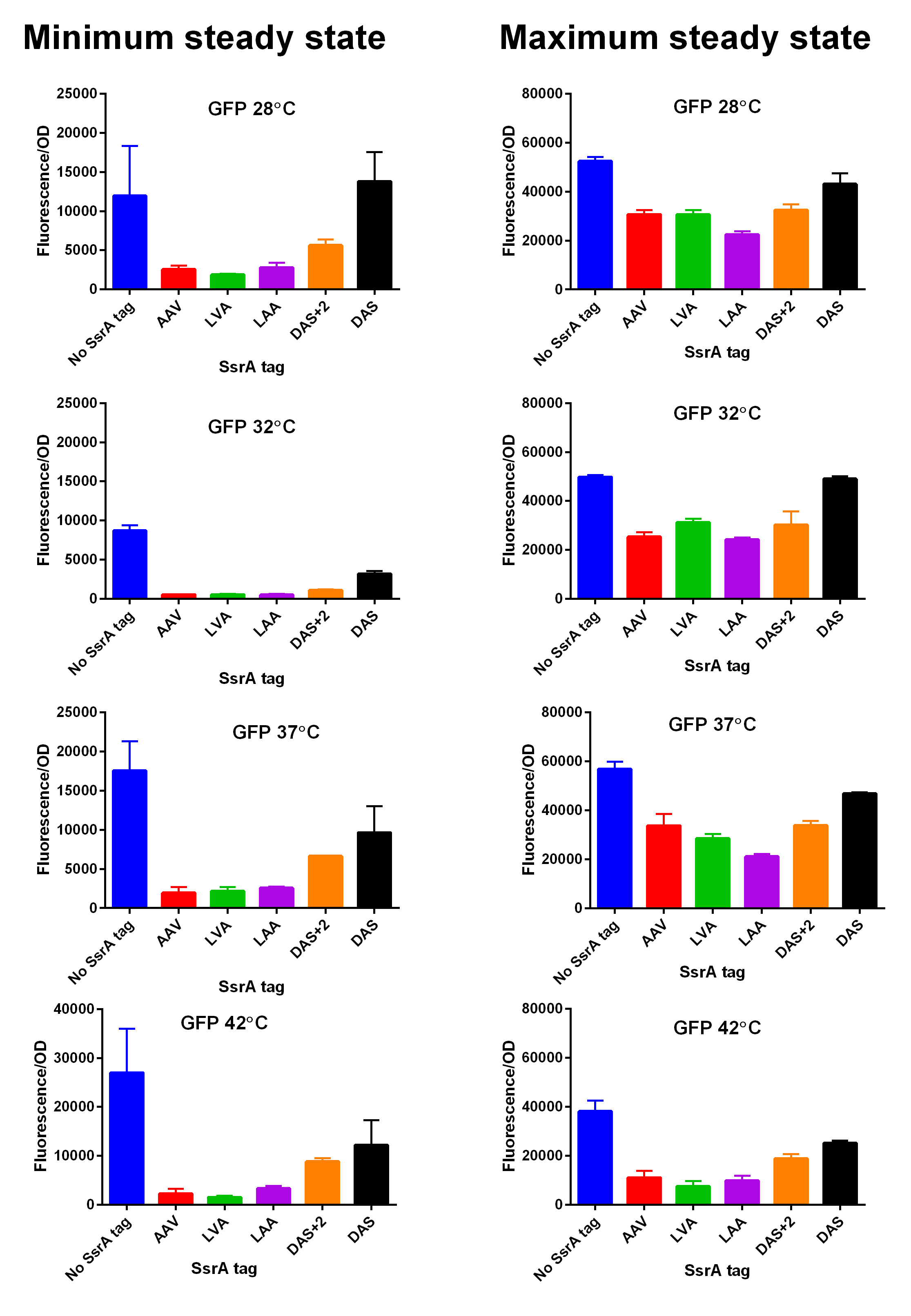Difference between revisions of "Part:BBa K1051206:Experience"
(→User Reviews) |
|||
| Line 19: | Line 19: | ||
<!-- End of the user review template --> | <!-- End of the user review template --> | ||
<!-- DON'T DELETE --><partinfo>BBa_K1051206 EndReviews</partinfo> | <!-- DON'T DELETE --><partinfo>BBa_K1051206 EndReviews</partinfo> | ||
| + | |||
| + | {|width='80%' style='border:1px solid gray' | ||
| + | |- | ||
| + | |width='10%'| | ||
| + | <partinfo>BBa_K1051206 AddReview 4</partinfo> | ||
| + | <I>iGEM14_Edinburgh</I> | ||
| + | |width='60%' valign='top'| | ||
| + | iGEM14_Edinburgh added this tag to RFP ([[Part:BBa_K1399002]]) and GFP ([[Part:BBa_K1399006]]) and constructed lactose/IPTG inducible measurement pathway ([[Part:BBa_K1399012]] and [[Part:BBa_K1399016]], respectively) to characterize and compare the instability of this SsrA-LAA tagged RFP and GFP to others containing different variants of SsrA tags. We determined the steady state fluorescence/OD ratio of E. coli JM109 at uninduced (minimum steady state) and induced (maximum steady state) state. To see how the temperature of environment can affect protein degradation efficiency we repeated experiments in several temperatures (28⁰C, 32⁰C, 37⁰C and 42⁰C). Our data are summarised below. (For more information on SsrA degradation tag system, our experimental assays and results please visit our wiki page [http://2014.igem.org/Team:Edinburgh].) | ||
| + | [[File:Tagged RFP min and max values at different temperatures.jpg|600px|thumb|center|'''SsrA degron tagged RFP minimum (left) and maximum (right) fluorescence per OD at four different temperatures (28⁰C, 32⁰C, 37⁰C and 42⁰C).''']] [[File:EDiGEM14 RFP legend.png|500px|thumb|center|'''Summary of BioBricks to which our characterization data is applicable.''']] | ||
| + | [[File:EdiGEM14 GFP min and max values at different temperatures.jpg|600px|thumb|center|'''SsrA degron tagged GFP minimum (left) and maximum (right) fluorescence per OD at four different temperatures (28⁰C, 32⁰C, 37⁰C and 42⁰C).''']] [[File:EDiGEM14 GFP legend.png|500px|thumb|center|'''Summary of BioBricks to which our characterization data is applicable.''']] | ||
| + | |} | ||
Latest revision as of 09:18, 16 October 2014
This experience page is provided so that any user may enter their experience using this part.
Please enter
how you used this part and how it worked out.
Applications of BBa_K1051206
User Reviews
UNIQ6e747ef8b344321d-partinfo-00000000-QINU UNIQ6e747ef8b344321d-partinfo-00000001-QINU
|
••••
iGEM14_Edinburgh |
iGEM14_Edinburgh added this tag to RFP (Part:BBa_K1399002) and GFP (Part:BBa_K1399006) and constructed lactose/IPTG inducible measurement pathway (Part:BBa_K1399012 and Part:BBa_K1399016, respectively) to characterize and compare the instability of this SsrA-LAA tagged RFP and GFP to others containing different variants of SsrA tags. We determined the steady state fluorescence/OD ratio of E. coli JM109 at uninduced (minimum steady state) and induced (maximum steady state) state. To see how the temperature of environment can affect protein degradation efficiency we repeated experiments in several temperatures (28⁰C, 32⁰C, 37⁰C and 42⁰C). Our data are summarised below. (For more information on SsrA degradation tag system, our experimental assays and results please visit our wiki page [http://2014.igem.org/Team:Edinburgh].) |




